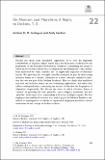Files in this item
On monism and pluralism : a reply to Dickins, T. E.
Item metadata
| dc.contributor.author | Rodrigues, Antonio | |
| dc.contributor.author | Gardner, Andy | |
| dc.contributor.editor | Dickins, Thomas | |
| dc.contributor.editor | Dickins, Benjamin | |
| dc.date.accessioned | 2022-10-05T10:28:35Z | |
| dc.date.available | 2022-10-05T10:28:35Z | |
| dc.date.issued | 2023-03-09 | |
| dc.identifier | 281576104 | |
| dc.identifier | 4dd390e2-1f97-4fb5-bb8b-e16a9346bbec | |
| dc.identifier | 85149930346 | |
| dc.identifier.citation | Rodrigues , A & Gardner , A 2023 , On monism and pluralism : a reply to Dickins, T. E. in T Dickins & B Dickins (eds) , Evolutionary biology : contemporary and historical reflections upon core theory . Evolutionary Biology – New Perspectives on Its Development , no. 6 , vol. 2524-776X , Springer , Cham , pp. 369-372 . https://doi.org/10.1007/978-3-031-22028-9_22 | en |
| dc.identifier.isbn | 9783031220272 | |
| dc.identifier.isbn | 9783031220302 | |
| dc.identifier.isbn | 9783031220289 | |
| dc.identifier.issn | 2524-7751 | |
| dc.identifier.uri | https://hdl.handle.net/10023/26133 | |
| dc.description | Funding: Natural Environment Research Council (NE/K009524/1) and European Research Council (771387). | en |
| dc.description.abstract | Dickins has made some thoughtful suggestions as to why the important contributions of inclusive fitness theory have not been more celebrated by the proponents of the Extended Evolutionary Synthesis, considering the extent to which inclusive fitness theory has accommodated and illuminated—and, indeed, been motivated by—their “laundry list” of supposedly neglected evolutionary factors. We agree that this oversight could be explained, in part, by their seeing inclusive fitness as a “monist” alternative to a more “pluralist” multilevel selection that was not part of the Modern Synthesis. Here we clarify that multilevel selection and inclusive fitness are not competing explanations, but rather they address orthogonal issues, concerning the process of selection and the purpose of adaptation, respectively. We discuss the sense in which inclusive fitness is “monist” in providing the only generally correct adaptive maximand, but also “pluralist” in the sense of accommodating a diversity of adaptive agents. We also emphasise that multilevel selection was, in fact, part of the Modern Synthesis and, indeed, its inadequacies as a theory of organismal adaptation provided a crucial motivation for the concept of inclusive fitness. | |
| dc.format.extent | 4 | |
| dc.format.extent | 150408 | |
| dc.language.iso | eng | |
| dc.publisher | Springer | |
| dc.relation.ispartof | Evolutionary biology | en |
| dc.relation.ispartofseries | Evolutionary Biology – New Perspectives on Its Development | en |
| dc.subject | Levels of biological organisation | en |
| dc.subject | Maximisation principle | en |
| dc.subject | Meta-science | en |
| dc.subject | Natural selection | en |
| dc.subject | Purpose of adaptation | en |
| dc.subject | Shifting balance | en |
| dc.subject | QH301 Biology | en |
| dc.subject | MCC | en |
| dc.subject.lcc | QH301 | en |
| dc.title | On monism and pluralism : a reply to Dickins, T. E. | en |
| dc.type | Book item | en |
| dc.contributor.sponsor | NERC | en |
| dc.contributor.sponsor | European Research Council | en |
| dc.contributor.institution | University of St Andrews. School of Biology | en |
| dc.contributor.institution | University of St Andrews. Centre for Biological Diversity | en |
| dc.contributor.institution | University of St Andrews. Institute of Behavioural and Neural Sciences | en |
| dc.contributor.institution | University of St Andrews. St Andrews Bioinformatics Unit | en |
| dc.identifier.doi | https://doi.org/10.1007/978-3-031-22028-9_22 | |
| dc.description.status | Peer reviewed | en |
| dc.identifier.url | https://doi.org/10.1007/978-3-031-22028-9 | en |
| dc.identifier.url | https://discover.libraryhub.jisc.ac.uk/search?isn=9783031220272&rn=1 | en |
| dc.identifier.grantnumber | NE/K009524/1 | en |
| dc.identifier.grantnumber | 771387 | en |
This item appears in the following Collection(s)
Items in the St Andrews Research Repository are protected by copyright, with all rights reserved, unless otherwise indicated.

